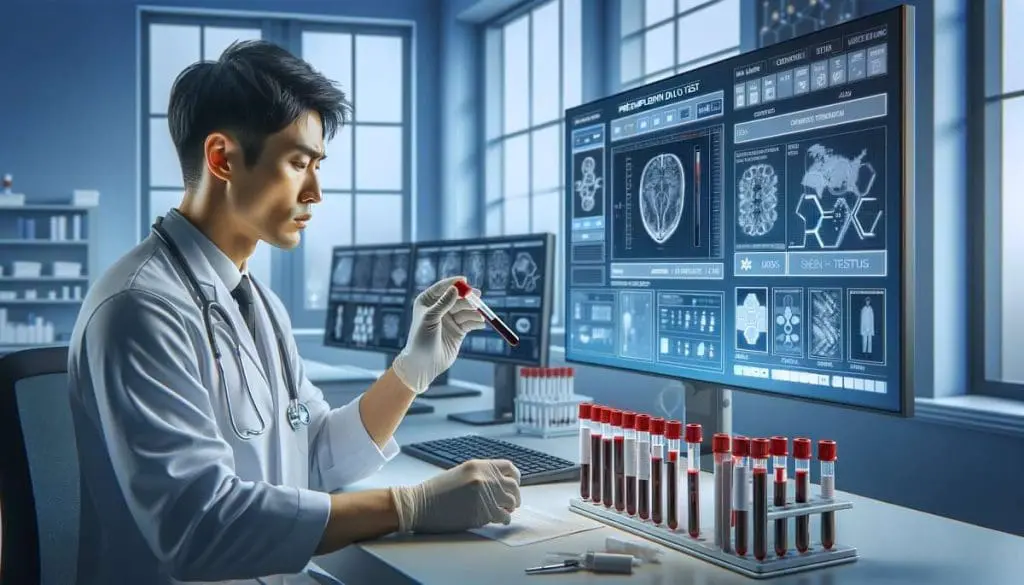A pre-employment blood test is an essential screening practice that ensures the safety and productivity of employees and the public. A blood test can be performed to determine whether prospective new hires have consumed alcohol or drugs, both prescription and illicit.
In this blog, we answer the question “What is a pre-employment drug test for?” We also explore how these blood tests are performed, common substances tested for, the legality of drug testing, and more.
Table of Contents
Understanding the Purpose of Pre-Employment Blood Tests

Implementing a pre-employment blood testing program can help employers maintain a drug and alcohol-free workplace while ensuring adherence to government regulations, including those set forth by U.S. Department of Transportation (DOT) and U.S. Department of Labor (DOL) laws.
By filtering out drug and alcohol use, pre-employment blood testing minimizes the risks associated with workplace incidents but also serves as a deterrent for substance abuse. This proactive approach can lead to a reduction in potential liabilities, translating into substantial cost savings.
In addition, pre-employment blood testing takes the guesswork out of hiring, reduces absenteeism, increases worker productivity and performance, and promotes a culture of health and wellness.
The Role of Drug Testing in Employment
Drug addiction is among the most common health conditions in America. In addition to affecting a person’s health, relationships, and finances, the impact of substance use disorders (SUDs) also extends to the workplace. According to Recovery Centers of America, 70% of people who use illegal drugs are employed either full or part-time, and 75% of those people don’t receive treatment.
In addition to productivity losses, SUDs are costly for employers. Recovered.org (formerly The National Council on Alcoholism and Drug Dependence) estimates that addiction costs employers $81 billion each year in healthcare expenses, disability and worker’s compensation, recruitment expenses, and more.
For these reasons, pre-employment drug screening is an important component of the applicant hiring process. In fact, many employers, such as those regulated by the DOT as well as safety-sensitive industries, including hospitals, first responders, and construction, test candidates for drug use before extending an offer.
Common Substances Tested in Pre-Employment Drug Tests
Some of the drugs that pre-employment drug tests detect include:
- Opiates, amphetamines, and narcotics: Drugs like cocaine can be highly addictive when used regularly and in large quantities.
- Phencyclidine (PCP): A street drug, also known as angel dust, PCP is a hallucinogen that can distort vision and hearing, and create feelings of detachment.
- Barbiturates and benzodiazepines: Including medications used to treat anxiety, depression, insomnia, etc.
- Marijuana
- Antidepressants: Side effects can include nausea, dizziness, and fatigue.
- Stimulants: Often prescribed for ADHD and other disorders, these substances can lead to increased heart rate, high blood pressure, and other serious side effects.
The most common pre-employment drug test is the five-panel test that detects cocaine, marijuana, amphetamines, opioids, and PCP.
Different Types of Drug Testing Specimens

There are a variety of methods used for drug testing, including urine, blood, hair, and saliva tests. Let’s look at these four primary forms of drug tests and the accuracy and detection period of each test:
- Urine tests: A urine drug screen is the most used drug test method. They are painless, easy, and cost-effective. Typically, the results become available within a few days, and in some instances, they can be obtained on the same day. However, urine testing has a small window for detection. Most substances can only be detected for five to ten days after the sample was collected.
- Blood tests: Blood tests are very accurate and can detect illicit substances in a matter of minutes or hours. However, they are costly and inconvenient.
- Hair follicle tests: Hair follicle drug screening is far more reliable than any other form of drug testing, including urine and blood sample analysis. That’s because drugs and drug metabolites remain in the hair as it grows. These tests can detect the use of cocaine, amphetamines, opioids, methamphetamines, PCP, and other drugs. Detection times vary from three months for scalp hair to up to a year for body hair.
- Saliva tests: A saliva test is an effective alternative to urine testing and is a useful backup if an individual fails to provide sufficient urine. Saliva tests detect drugs within a short time frame, typically within 48 hours. The DOT recently authorized the use of oral fluid testing as part of employer DOT drug testing programs. The choice of whether to conduct an oral fluid or a urine test is up to the employer.
The Legal Aspects of Pre-Employment Drug Testing

Most states permit employers to test job applicants for drugs or alcohol, although the legality of testing varies by state. Furthermore, the specific guidelines and protocols for these tests are typically established by the employer in compliance with state employment regulations.
Note: Industries regulated by the DOL and DOT are required by law to test job candidates for drugs and alcohol.
Best Practices for Pre-Employment Drug Testing
The following best practices can help employers administer legal and fair pre-employment blood tests:
- Job applicants must be informed about the inclusion of drug or alcohol testing in the interview process.
- Tests must be carried out by a state-certified lab and reviewed by a Medical Review Officer (MRO).
- Equal opportunity laws and the Americans with Disabilities Act (ADA) require that all applicants for the same position must undergo the same type of drug test.
- Employers must treat employee health information as confidential in accordance with HIPAA and the ADA. All applicant information, including personally identifiable information (PII), protected health information (PHI), and test results should remain confidential. Drug and alcohol test results should only be shared on a need-to-know basis with the relevant department.
The Importance of Partnering with Occupational Health Providers
While many urgent care providers offer pre-employment drug testing services, they may not possess the expertise required to conduct a comprehensive range of tests, such as urine, blood, hair follicle, saliva, and others to ensure compliance with government regulations. Moreover, these providers lack the capability and scale to offer the essential support and assistance that employers require. This includes aiding in developing a drug testing program, real-time test tracking and reporting, data management and secure transmission, and physician medical review services, among others.
By working with a specialized health provider for drug and alcohol testing (DAT), employers can implement an accurate, compliant, flexible, and scalable program that meets their unique needs and risks. These services should be backed by robust case management, tracking, and secure HIPAA-compliant reporting services.
Occupational health providers also offer comprehensive support, including subject matter expertise, guidance, program management, and training on implementing pre-employment drug testing programs.
For additional flexibility, employers should seek out a provider who can perform testing onsite or via mobile occupational health clinics.
Additional Pre-Employment Tests and Screenings
Additional pre-employment tests and screenings may be required for specific jobs and industries, especially if the position is physically demanding. In such cases, it is advisable to conduct pre-employment physical exams. These tests evaluate several factors, including:
- Physical ability (including the ability to perform certain functions required for the position, such as lifting or aerobic activity)
- Vital functions (heart, vision, hearing, etc.)
- Mental health, emotional, psychological, and cognitive function
- Strength, stamina, and physical endurance
Other tests include respirator fit exams and COVID testing.
Preparing for a Pre-Employment Blood Test: What to Expect

To prepare for a pre-employment blood test, job applicants should follow these steps:
- Bring a photo ID to the collection site.
- Complete all relevant paperwork accurately (paying special attention to reporting prescriptions and prescription drug use, including dosage).
- For urine tests, drink plenty of water beforehand. The test requires 45 milliliters of urine. If an individual can’t produce sufficient urine the collector will provide a reasonable amount of fluids to drink during a period of time up to three hours.
Once collected, the sample will be sent to a state-certified lab for testing and review by an MRO.
Pre-Employment Blood Tests: An Essential Screening in the Modern Workplace
Prioritizing workplace safety is paramount for any company, and one effective measure to mitigate risks linked to drug and alcohol misuse is the implementation of pre-employment drug tests. By clearly stating on a job application that a job offer could depend on the outcome of a drug test, an employer can discourage individuals with substance abuse issues from applying in the first place.
This is especially crucial for roles in safety-sensitive environments. Pre-employment drug testing plays a critical role in ensuring compliance with DOT and DOL regulations, minimizing workplace accidents and injuries, and reducing the frequency and cost of expensive workers’ compensation claims related to drug or alcohol use.
If you are looking to start or optimize your pre-employment blood testing program, contact us to learn more about how Acuity can help. We combine our pre-employment drug and alcohol testing services with advanced technology and a widespread provider network to give organizations 24/7 access to scheduling, exam status notifications, case management reporting, and more.
We also provide comprehensive pre-employment physical exam services so you can be assured that a job candidate does not have physical limitations or an existing medical condition that would prevent them from performing a job.
Learn more about Acuity’s comprehensive portfolio of Occupational Health Services.
